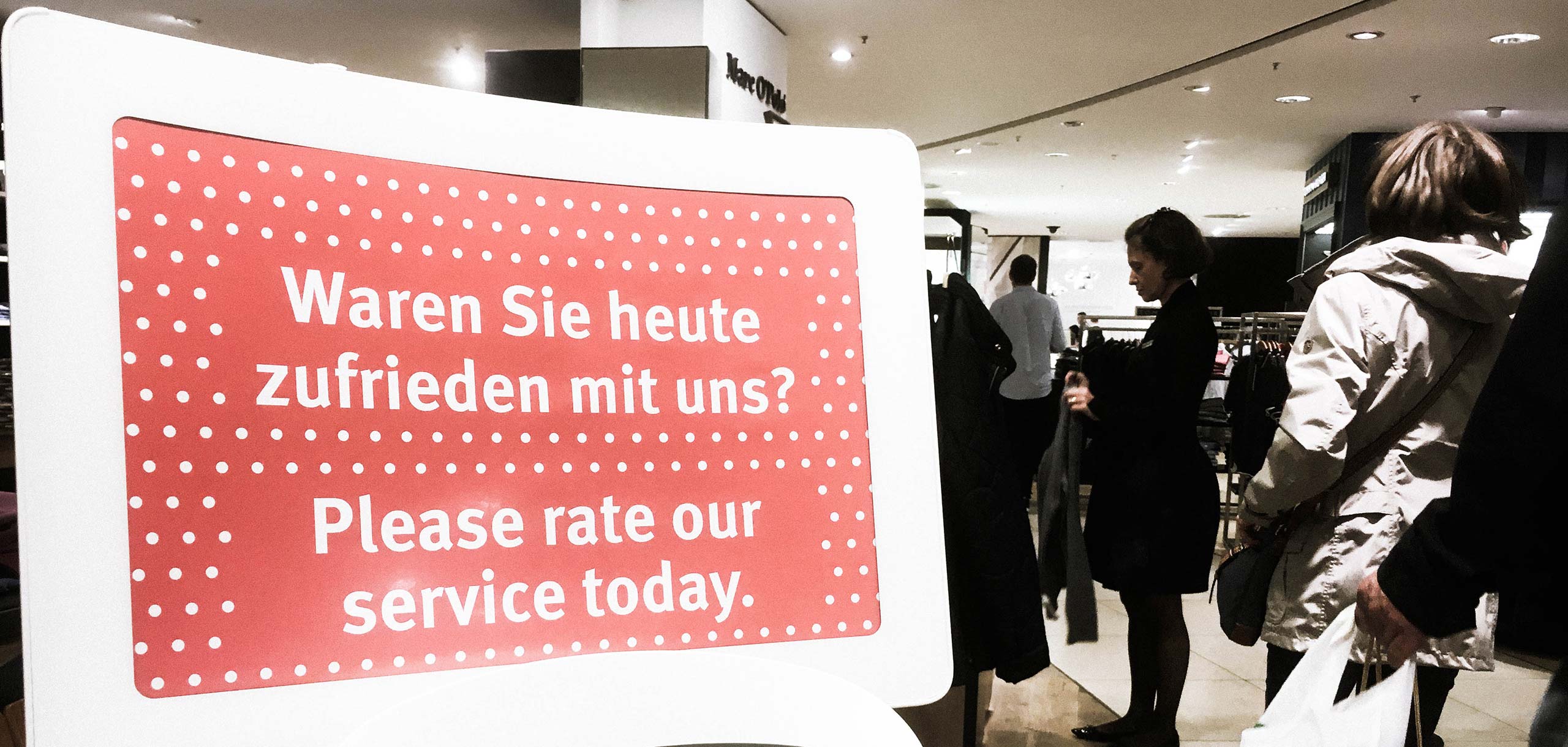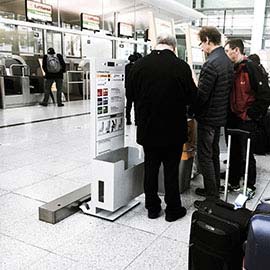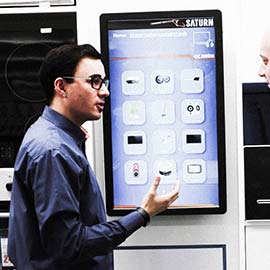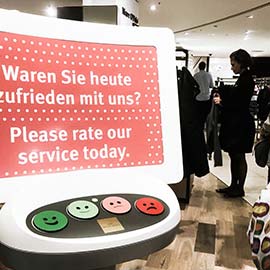Customer delight – it’s that simple, isn’t it …!?
When was the last time you were truly impressed by a company– as a customer that is? Yeah? When, where and why? Just the fact alone that you had to think for a while – or perhaps even have to think about it still – is proof enough of the sad reality that all’s not well in the much hyped about and strongly proclaimed “era of the customer” – well the quintessential ‘golden era of the customer’.
Customer delight in the „era of the customer“!
According to a Forrester-analysis, the era of the customer is a 20-year cycle, during which the most successful companies re-invent themselves in order to gain a better understanding of increasingly demanding customers and in turn be better able to meet their raised expectations. “It’s a buyer’s market, stupid!” has been heard from the executive echelons of American company boardrooms for some time already – I see! The question that springs to mind here clearly is, when will companies actually begin – in practice – to reinvent themselves as enterprises in such a way that the customer will take notice or – better even – experience the service improvement – positively, of course? One of the greatest challenges for managers obviously lies in walking that fine line between the theoretical realization about ways of generating customer loyalty and actually implementing aforesaid in practice, as management and also through the company staff.
„If it’s common sense, why can’t we make it common practice?” the American would ask. “However, common sense does not necessarily equate to common practice! “, you could reply as native German speaker. Many would agree that the “era of the customer“ literally spells out the problem – namely „the customer“! As Jean-Paul Sartre once said so aptly: “In football, everything is complicated by the presence of the other team.“ Simply replace the word ‚football‘ by company and ‚the other team‘ by customer. Exactly – everything has been complicated, because customers are smart, well informed, networked, independent and have high expectations, because the more each individual owns in today’s consumer society, the more picky he becomes. That’s a fact! But customers work somewhere too – and for sure – they aren’t simply more stupid all of a sudden. Each employee of a company is the smart customer of another company somewhere. In principle, we’d all know what to do to delight a customer – however, we don’t actually do it! Conversely, we expect, however, that someone else does it for us and with us as the customer. “Knowing” and “doing” are and remain two entirely different issues! We believe that as soon as we know something, we will always remember it and we will put our ‘know-how’ into practice. It’s not that simple. Even a simple truism – such as the ‘golden rule’ of practical ethics : ”Do unto others as you would have others do unto you!” – suddenly presents a virtually unsurmountable challenge for many employees in their daily business routine. Especially in dealing with customers – that is dealing with ‘others’! The former president of the Federal German Republic, Roman Herzog, once said: “We are a strange people indeed, if we are capable of operating machines with a smile, however, our smile freezes when it comes to serving customers.“ How right he was!
The „most common“ reasons, why customers terminate their relationship with a company – a fact even confirmed by recent studies – are still as follows:
- unfriendly attitude and lack of courtesy
- incompetence, ignorance and lack of knowledge of staff
- long waiting periods on the phone, in the shop or in the service area
- general ignorance and lack of interest in the customer
- grumpiness and lack of motivation of staff
- arrogant attitude
What are less successful enterprises doing to counter this situation?
There are different ways of making inroads. One trend is the shift from direct interaction between customer and staff to a man-machine-interaction – “more customer friendly autonomy around the clock through the option of self-service, either through creating an online shop or providing a highly modern self-service machine. Quite apparently the wrong inference drawn from Mr. Herzog’s quote. At least, the online shop or the vending machine are consistently in a „neutrally friendly mood” and usually pose fewer “challenges” than human employees. However, since such investments ‚cost a pretty penny‘, companies have no choice but to further cut costs for implementing qualitative measures in human resources. Should their recorded volume of sales decline any further, they will try even harder to cling to old patterns since they used to work well. However, in a futile attempt to bang their heads against a brick wall they overlook new opportunities opening up, doors that could open and provide access to success. Remaining staff are popularly sent off on training courses, where they learn to ‚professionalize‘ outdated concepts, an approach which only continues the vicious cycle of reinforcing that which hasn’t worked well, only that functioning no better works even better now – well, the very pointless effort of beating the head against a brick wall. Another very popular trend is the delegating or “outsourcing” of labour intensive tasks, apparently perceived as too burdensome to tackle in-house to a third party. The call centre has become an extremely popular ‚playground‘ for customers who happen to have questions with regards to products and services of a company and who will only be allowed to talk to real staff of the company on terms of “3rd level support”, after having navigated a ‘telecommunicative minefield’. Well, if at all! Check out a highly commendable, short video clip well worth viewing on the following link, a humorous take on an otherwise still lamentable reality.
We also repeatedly notice new employees whose „initial training“ by predecessors or colleagues is often based on maintaining their own practices rather than the company’s guidelines. At best they may be told about the ‚what‘ – as for the how, why and what for the new employee is usually left to his own devices. Oh, and by the way: the product training, according to “management info“, only takes place outside office hours – so, don’t forget to clock out! Theory defined is if you know everything but nothing works nonetheless. Practice defined is if everything works but no one knows why. In some organisations theory and practice are combined: nothing works and nobody knows why. Perhaps a touch too sarcastic, however, there’s a grain of truth. It is therefore hardly surprising when staff members continue to confuse the „on the stage“ with „behind the scenes“, or even fail to distinguish between the two altogether. Think about it – how often have you become witness to unwanted eavesdropping of internal staff issues at the cashpoint? Certainly not a new problem as you can see for yourself from the incredibly relevant video clip from “Papa Ante Portas” .
Or how often have staff members explained down to the last detail, without you actually asking them to do so, why a certain product is not available due to some operational shortcomings, or why a colleague couldn’t turn up to a prearranged appointment. And anyway, if they were in charge of operations, everything would be different, after all, they understand the customers‘ problems, but can’t do anything about them and due to lack of interest on the part of top management there is no hope for improvement – on the contrary, things are likely to get worse! Thank you very much, this candid display of information is not going to get me excited as a customer. Oh, by the way, if you run out of new ideas, there’s always the option of lowering the prices. The never ending pricing battle – combined with the interchangeability of service providers, as well as products and services – is largely based on the fact that the true expectations of customers in the service industry are completely ignored.
How do successful business enterprises keep their customers coming back for more?
Successful corporates simply apply „common sense“ : „Customers (humans) go for/appreciate/trust/recommend businesses (humans) that keep their promises.“ However, successful enterprises take it a step further, because they not only know what “common sense“ calls for, they also stick to it and basically turn this simple truth into their daily ‘in-house use’! It’s a given that theory must be translated into practice by humans. Otherwise it will remain completely ineffective. Their motto is: „It’s common sense and common practice!” However, the term customer delight can never be equated to customer satisfaction. Customer satisfaction simply means that the customer actually receives the service he expected in the first place. At least, he feels that the service provided met his expectations. Dissatisfaction arises when the customer’s expectations were higher than the perceived service performance. Customer delight on the other hand is the positive result of successfully exceeding the customer’s expectations. At least, the customer has to believe that he got more than he bargained for and is therefore pleasantly surprised! The surprise effect is a significant component of generating customer enthusiasm, it is exciting and gives the customer the feeling that he just experienced something special which also makes him feel special in turn.
Every customer is strongly influenced by emotions, each time a purchase is made!
Purchase decisions are not just planned in the head but equally with the heart and soul. Of course, products that impart positive feelings and a happy mood rather than just cold hard facts score markedly higher. Positive emotions are generated amongst others through aesthetics, appealing to all 5 senses, humour, uniqueness, ambience, familiarity and prestige. It’s no longer just about buying a product or service but all about the values and the sentiment that a phantasy, a desire or dream come true. By choosing the right images you are creating film snippets in the mind, something that is extremely conducive to drawing attention, advising, offering and selling. In the end, your customers are expecting an extraordinary experience and you ,of course, an outstanding business result.



























